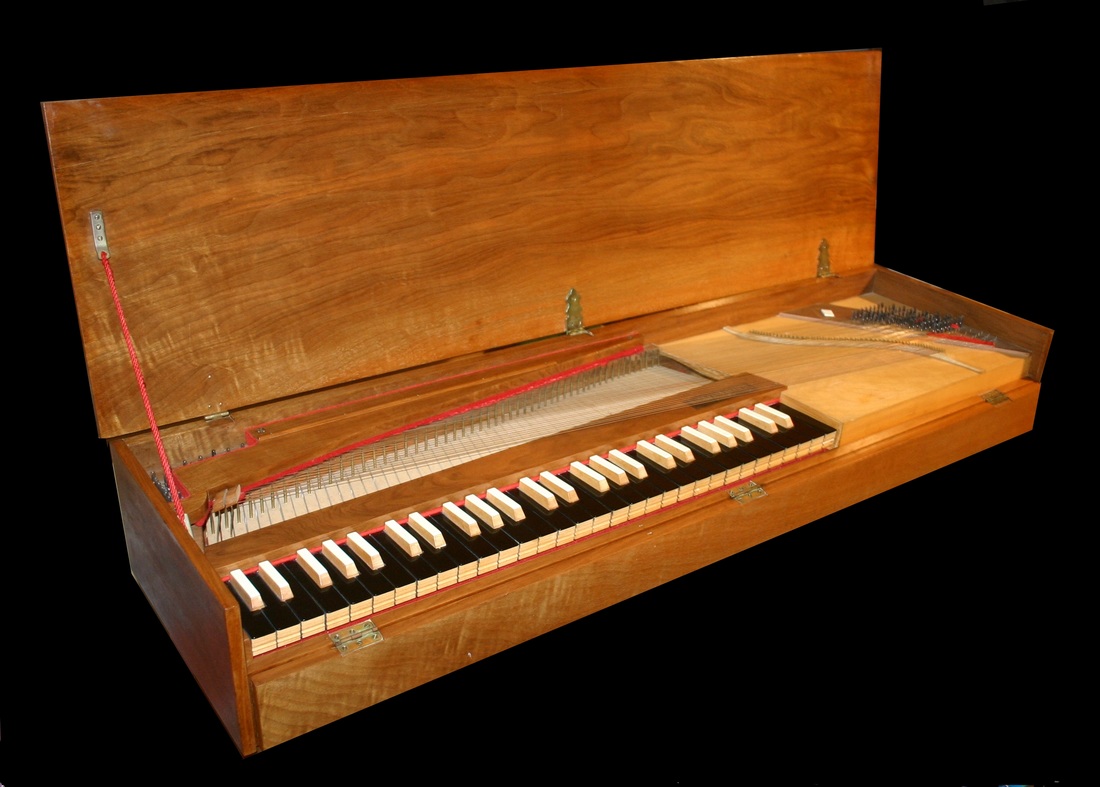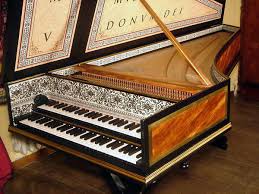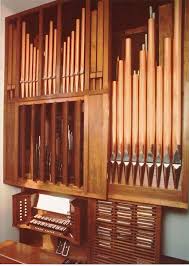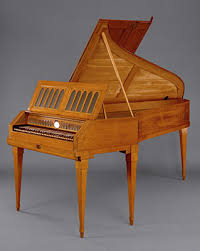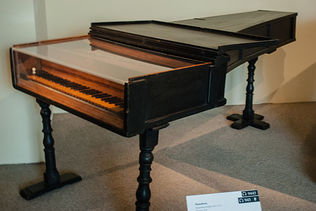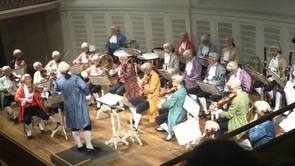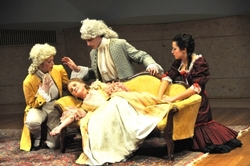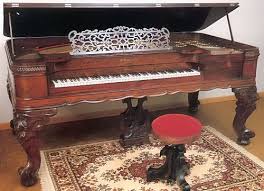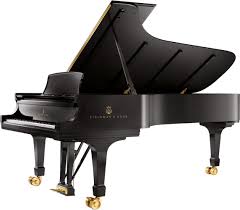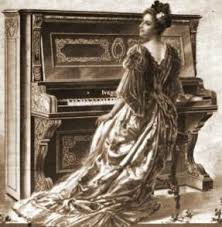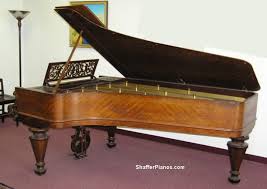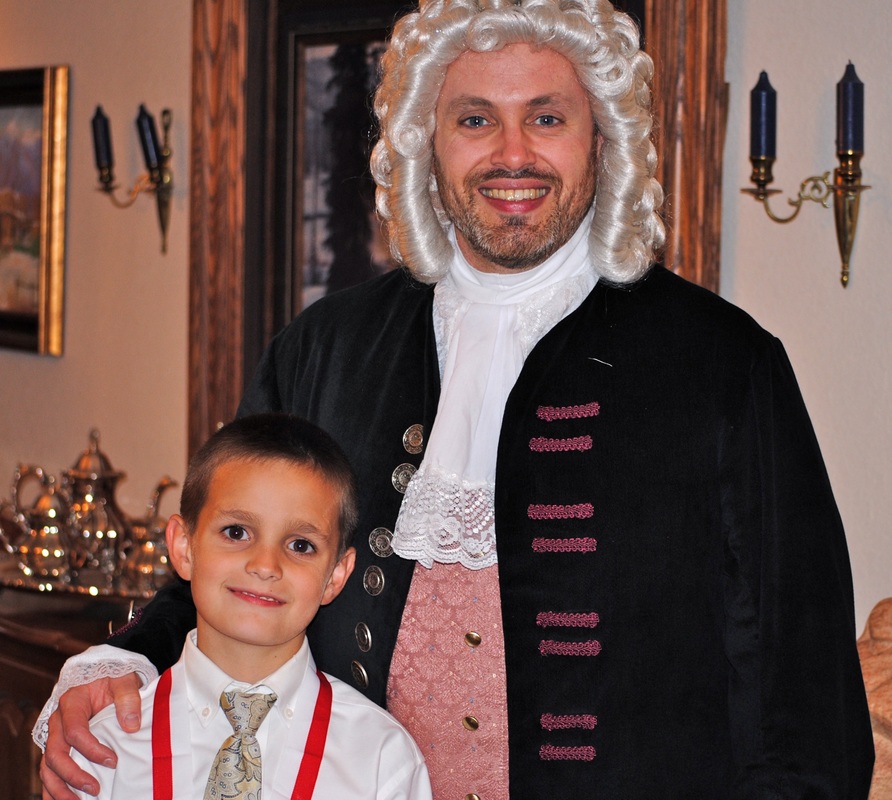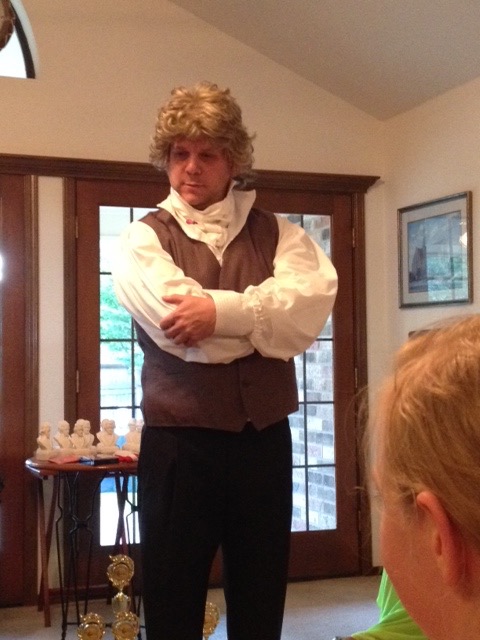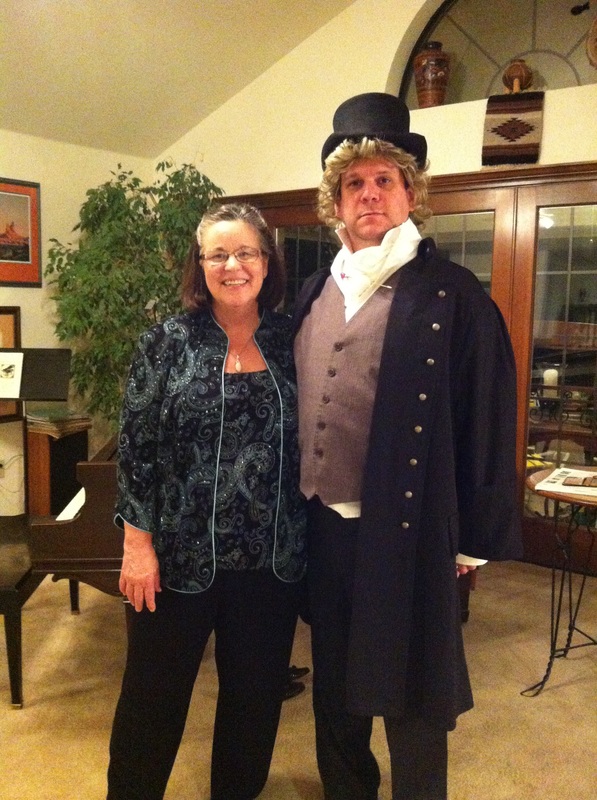2017-18 Mystery Composer Contest
We are off and running!
Students received their first "clue" at the August Group Lessons. We discussed the list of composers I take the current year's Mystery Composer (M.C.) from, the list of former Mystery Composers and a description of the general historical periods of music. An additional clue was handed out at the October Group Lessons. Since, due to my family emergency/obligations there were no December Groups, there was not a December clue. The January and February clues were handed out at the February Group Lessons The April Group Lesson will be spent on the history and music of this year's Mystery Composer. See below for August's clues as well as the links to the October, January and February clues.
Rules of the contest are:
Prizes:
Happy Research!!
Students received their first "clue" at the August Group Lessons. We discussed the list of composers I take the current year's Mystery Composer (M.C.) from, the list of former Mystery Composers and a description of the general historical periods of music. An additional clue was handed out at the October Group Lessons. Since, due to my family emergency/obligations there were no December Groups, there was not a December clue. The January and February clues were handed out at the February Group Lessons The April Group Lesson will be spent on the history and music of this year's Mystery Composer. See below for August's clues as well as the links to the October, January and February clues.
Rules of the contest are:
- Students must do their own research. They may use the internet, the library, or books you have at home. (Early elementary students may have parental help at the computer. Parents, please do not do the work for students--let them figure out how to use the clues to search for their information needed. You may "guide" your student by asking them leading questions.)
- You must email the results of your research (no telephone conversations or texts, please) for I print the correspondence and place in your Group Notebook. In order for you to receive a correct answer you must include the following:
- Name of the Mystery Composer
- Dates of birth and death (unless still living)
- Why did you pick this particular composer? Which part of my clue did you use?
- If used, list any and all websites you searched.
- I will answer your email as soon as possible with either a "congratulations" or a "hmm.....this part is good but I need (fill in the blank)."
- There will be ties. Group lessons are held on 3 different days in the week; each group will be allowed the same amount of time for students to research and turn in the results of that research. I will say that the competition in the High School Group has been rather cutthroat in the last several years. The contest now is not for which level of prize to aim for but to see who can qualify for the grand prize in the shortest amount of time. This makes for very interesting and fun emails.
Prizes:
- Grand Prize: $20.00 Gift Certificate to Barnes and Noble
- Group Prize: $15.00 Gift Certificate to Barnes and Noble
- Honorable Mention: $10.00 Gift Certificate to Barnes and Noble
Happy Research!!
M.C. Contest WinnersCongratulations to the below winners! As of February 5, there were ? Grand Prize winners and one Group Prize Winners. Deadline for group prizes is February 14! Deadline for Honorable Mention is March 16! Good luck!
M.C. Winners (2017-2018). M.C. CluesAugust 2017Links to two of the clues are: List of Composers; Previous Mystery Composers.
Ages of Music
|
|
The Mozart Vienna Orchestra
|
Haydn's opera La Canterina
(The Diva) |
Romantic Period (1810 - 1910)
This era saw the perfection of the modern day piano. this instrument was enlarged and perfected in its action, pedals, frames, and sound boards. The piano now used large metal frames inside the wood casings. Concert grands were as large as nine feet long and able to produce a wide range of sound. Other pianos were square, thin and tall, or rectangular in order to fit into the homes of the now large middle class. Composing for, and playing, the organ came back in style with the improvements of wind supply and the ability to have huge, orchestral organs. Virtuoso playing, chromatic harmony, the um-pah-pah bass and idiomatic keyboard figures were the standard of the day. Leaving the courts (many "courts" were disappearing), music was performed in concert halls. Forms include program and character pieces, rhapsodies, fantasy sonatas and concertos, two-piano works, and etudes along with the ever evolving sonata, concertos, and variations.
20th Century/Contemporary/Modern (1900 - present)
The last century has seen a theme and variation on the keyboard instrument. Today we use the organ, piano, celesta, harpsichord, electronic keyboards, digital keyboards, even I-pads and I-phones and can perform on an instrument while being accompanied at the same time by that very same instrument. This is the age of experiments in harmony, tonality, and sonority. Various percussive touches, a return to motivic and polyphonic writing and complex meters are also used. Taped sounds can be used as well as "prepared" instruments. Music is performed in concert halls, churches, auditoriums, stadiums, arenas and even our smart phones. The musical theatre is important as are the scores of movies (think of Phantom of the Opera or the Harry Potter series). We can also hear music of any kind and age on the radio, television, recordings, computer and, once again, our smart phones. Forms used are those of the past as well as "chance" pieces and through composed.
October 2017
By the time Beethoven had died in 1827 and Schubert in 1828, changes were in the air all through Europe. The invention of the steam engine (which started what is called the “Industrial Revolution”) changed how people lived. The train was invented and railroads were built all over Europe to carry people, food, clothes and supplies to different places. Instead of taking weeks to travel to a different city by walking or riding horses or by horse-drawn carriages, one could now just take days by riding the train. People called the “middle class” came into being. They weren’t members of the royal family, nor were they farmers. These people were the merchants or store owners. People also started talking about science and medicine. Poets were writing different kinds of verses, about themselves and verses that almost sang. New attitudes about life, religion, economics and politics were in the air. Believe it or not, the church and king were not necessarily always right! In the arts, everybody was talking about Romanticism. Modern life came into being.
Music changed like everything else. Technology improved the unreliable wind instruments of the eighteenth century, adding keys and valves, and for the first time brass instruments could really play in tune. The delicate Viennese pianoforte of Mozart’s time (remember the sound from last year?) and the more robust instrument of the Broadwood fortepiano that so delighted Beethoven gave way to a big piano with a cast iron frame—again, courtesy of the Industrial Revolution. Lots of composers and virtuosos rushed to take advantage of it.
This year’s M.C. was part of the that change. He loved writing unusual tonal combinations, sophisticated chords, and chords that used sevenths, ninths, and even elevenths. He had his own sound—a rich, sensuous, colorful sound. He was a person who liked to be by himself, was a dreamer and couldn’t separate composing music from writing words. He loved to read and often read when he was supposed to be working at something else. He wrote about music, musicians and artists. He was a great composer who felt that music was to be like the inside of your mind. He often thought a short statement was as good as a long speech and consistently composed music like that.
From an early age M.C. wanted to study music. The youngest child, M.C. was happiest when he was listening to music be it at the church or on street corners in the small Saxon town of his birth. At the age of seven his father sent M.C. to St. Mary’s Church where the organist had agreed to teach the young boy. Within a year M.C. was composing dance tunes to play for his friends. His teacher often told him, “God has given you a great talent, and very precious is such a gift. Use it well.”
Music changed like everything else. Technology improved the unreliable wind instruments of the eighteenth century, adding keys and valves, and for the first time brass instruments could really play in tune. The delicate Viennese pianoforte of Mozart’s time (remember the sound from last year?) and the more robust instrument of the Broadwood fortepiano that so delighted Beethoven gave way to a big piano with a cast iron frame—again, courtesy of the Industrial Revolution. Lots of composers and virtuosos rushed to take advantage of it.
This year’s M.C. was part of the that change. He loved writing unusual tonal combinations, sophisticated chords, and chords that used sevenths, ninths, and even elevenths. He had his own sound—a rich, sensuous, colorful sound. He was a person who liked to be by himself, was a dreamer and couldn’t separate composing music from writing words. He loved to read and often read when he was supposed to be working at something else. He wrote about music, musicians and artists. He was a great composer who felt that music was to be like the inside of your mind. He often thought a short statement was as good as a long speech and consistently composed music like that.
From an early age M.C. wanted to study music. The youngest child, M.C. was happiest when he was listening to music be it at the church or on street corners in the small Saxon town of his birth. At the age of seven his father sent M.C. to St. Mary’s Church where the organist had agreed to teach the young boy. Within a year M.C. was composing dance tunes to play for his friends. His teacher often told him, “God has given you a great talent, and very precious is such a gift. Use it well.”
January 2018
After the early death of his father when M.C. was 16, his mother demanded that he pursue an education in law rather than an insecure or less than lucrative future as a musician. While in law school, M.C. continued to play the piano and compose, which often kept him distracted from his studies. After several years spent struggling through law school, it became clear to M.C. that what he wanted most was to be a pianist and composer. In 1830, his mother relented and agreed to give him a trial period of six months. He moved to Leipzig to study with Friedrich Wieck and never went back to law.
M.C. was impatient with his progress and could not accept being second to anyone. During his teacher’s absence, he experimented with mechanical means of increasing his finger dexterity. He would tie his fourth finger in place and play with the others, trying to gain independence of the fingers. He soaked his hands in ox blood and other liquids. These efforts produced disastrous results. His right hand was permanently damaged, and he was forced to accept the fact that he could never succeed as a great piano virtuoso. With his characteristic determination, he decided to make his career as a great composer. In July of 1832, when he was 22 years old, he wrote to his brother, “I cannot tell you how good my spirits are, and with what pleasure and diligence I am now working away at my life’s goal.”
Not only was M.C. determined to write great music; he was also eager to improve the quality of music being composed all over Europe. In the summer of 1833 he found himself established in Leipzig meeting with friends in restaurants and homes talking about music and the arts. He and his friends were idealistic in their views on music; they hated mediocrity and found much new music to be dull. They crusaded for their idols, Beethoven and Schubert. One evening M.C. sprang to his feet and cried: “Gentlemen, we are always scolding about this state of affairs, but nobody does anything about it! Now I say let’s do something to raise our country’s musical standards. Let’s organize a movement against the silly finger-twiddling that generally passes for music in Germany. Today only amateurs run the musical journals. Let us organize one edited and written by professionals! Let’s start something!”
Amid loud cheers, the proposal was accepted, and an organization known as the Davidsbündler, or David’s Club was born, dedicated to encourage the composition of better music and to speak out against the use of cheap effects. They were to do battle against the “hack-writers” who were turning out vast quantities of poor music, whom they called the Philistines. The group founded the most important music journal of the century, the Neue Zeitschrift fur Musik (New Journal for Music). M.C. became the first editor, a position he held from 1835 to 1844. His effect as editor and writer was immediately in evidence through his provocative articles. He often used pseudonyms when writing. Typically, he created characters to represent various viewpoints. Not only did the characters appear in writing but they also appeared in his piano music as well. “Raro” was used when he spoke as a teacher. “Florestan” was an active, fun-loving character, an extrovert and assertive person. “Eusebius” was an introvert, serious and searching idealist. In M.C.’s Carnival, Op. 9, Florestan and Eusebius each have movements named after them. In Davidsbündlertanze, an “F” or “E” is written at the end of each section. Even when neither character is indicated, the dramatic contrast between extrovert and introvert represented by Florestan and Eusebius is an important and defining feature in all of M.C.’s music.
M.C. was impatient with his progress and could not accept being second to anyone. During his teacher’s absence, he experimented with mechanical means of increasing his finger dexterity. He would tie his fourth finger in place and play with the others, trying to gain independence of the fingers. He soaked his hands in ox blood and other liquids. These efforts produced disastrous results. His right hand was permanently damaged, and he was forced to accept the fact that he could never succeed as a great piano virtuoso. With his characteristic determination, he decided to make his career as a great composer. In July of 1832, when he was 22 years old, he wrote to his brother, “I cannot tell you how good my spirits are, and with what pleasure and diligence I am now working away at my life’s goal.”
Not only was M.C. determined to write great music; he was also eager to improve the quality of music being composed all over Europe. In the summer of 1833 he found himself established in Leipzig meeting with friends in restaurants and homes talking about music and the arts. He and his friends were idealistic in their views on music; they hated mediocrity and found much new music to be dull. They crusaded for their idols, Beethoven and Schubert. One evening M.C. sprang to his feet and cried: “Gentlemen, we are always scolding about this state of affairs, but nobody does anything about it! Now I say let’s do something to raise our country’s musical standards. Let’s organize a movement against the silly finger-twiddling that generally passes for music in Germany. Today only amateurs run the musical journals. Let us organize one edited and written by professionals! Let’s start something!”
Amid loud cheers, the proposal was accepted, and an organization known as the Davidsbündler, or David’s Club was born, dedicated to encourage the composition of better music and to speak out against the use of cheap effects. They were to do battle against the “hack-writers” who were turning out vast quantities of poor music, whom they called the Philistines. The group founded the most important music journal of the century, the Neue Zeitschrift fur Musik (New Journal for Music). M.C. became the first editor, a position he held from 1835 to 1844. His effect as editor and writer was immediately in evidence through his provocative articles. He often used pseudonyms when writing. Typically, he created characters to represent various viewpoints. Not only did the characters appear in writing but they also appeared in his piano music as well. “Raro” was used when he spoke as a teacher. “Florestan” was an active, fun-loving character, an extrovert and assertive person. “Eusebius” was an introvert, serious and searching idealist. In M.C.’s Carnival, Op. 9, Florestan and Eusebius each have movements named after them. In Davidsbündlertanze, an “F” or “E” is written at the end of each section. Even when neither character is indicated, the dramatic contrast between extrovert and introvert represented by Florestan and Eusebius is an important and defining feature in all of M.C.’s music.
February 2018
M.C.’s teacher in Leipzig, Friedrich Wieck, was considered the best at that time. He taught his daughter, Clara, from the age of five. Clara was expected to practice 2 hours a day; by the time she was eight, she was performing Mozart piano concertos in public. Clara was nine years old when M.C. came to Leipzig to study with her father. M.C. admired Clara’s talent, her charm, and vitality. She was sixteen the first time he kissed her—the night before she left on a concert tour. When Clara’s father learned of their interest in each other, he forbade their meetings. There were long periods when they could neither correspond nor see each other. Davidsbündlertanze, was written, M.C. wrote, with “wedding thoughts”. After many failed attempts to obtain permission from Wieck to marry Clara, M.C. filed a petition with the courts. On August 12, 1840 the thirty-year-old M.C. and twenty-year-old Clara Josephine Wieck were granted legal permission to marry. The day before her 21st birthday, the couple was married in a simple service attended only by Clara’s mother and aunt and a few friends. M.C. and Clara would eventually have eight children of whom only five lived to maturity.
M.C. composed music and continued to write for the Journal; Clara performed as well as composed. In 1844 they left Leipzig and moved to Dresden with their two children, hoping that M.C.’s “weakness of the nerves” would improve. They traveled so Clara could continue to perform. M.C. kept writing and composing; he became the musical director at Düsseldorf. However, M.C.’s “nerves” kept getting worse and “stalking” him. In February, 1854, M.C. jumped into the Rhine River. Upon being rescued he asked to be confined in an asylum. The doctors would not allow Clara to visit her husband. In June, the couples’ last son was born. In the fall, “haunted by music as never before”, she resumed serious practicing. In the spring of 1856, she left for England where she gave 26 concerts. Upon her return from England she was finally allowed to see her husband—two days before he died. She wrote in her diary, “He smiled and put his arm around me with great difficulty—for he no longer can control his limbs. I shall never forget it.” Two days later M.C. was buried in Bonn. Clara ended her diary entry: “…with his departure, all my happiness is over.”
Fortunately, M.C., who composed some of the most difficult piano music, took a special interest in writing pieces to be played by young students. In August of 1849 M.C. started writing pieces for the birthday of his oldest daughter, Marie. He had so much fun writing them, he composed more, finishing them just before Christmas. These became the Album for the Young, Op 68. Titles include “the Merry Farmer”, “Soldier’s March”, and “The Wild Rider.”
M.C.’s music is, of course, “Romantic” music and his short piano pieces may be regarded as romantic tone poems. They are remarkable for their variety, enthusiasm, resourceful invention, novelty of harmony, rhythm, melody, and for their spontaneous reflection of every facet of a personality rich in imagination and full of intimate charm. Each composition is a miniature masterpiece, with perfect symmetry, balance, and moving to its own appropriate climax and imparting always something original and worth saying. Some of these pieces have achieved for M.C. as much fame as any of his longer works. Compositions from both Opus 15 (Scenes from Childhood) and Opus 68 have been performed on public recitals by such notables as Vladimir Horowitz, Harold Bauer and John Browning.
So. Who is this year's M.C.?
********************************************************************************
M.C. composed music and continued to write for the Journal; Clara performed as well as composed. In 1844 they left Leipzig and moved to Dresden with their two children, hoping that M.C.’s “weakness of the nerves” would improve. They traveled so Clara could continue to perform. M.C. kept writing and composing; he became the musical director at Düsseldorf. However, M.C.’s “nerves” kept getting worse and “stalking” him. In February, 1854, M.C. jumped into the Rhine River. Upon being rescued he asked to be confined in an asylum. The doctors would not allow Clara to visit her husband. In June, the couples’ last son was born. In the fall, “haunted by music as never before”, she resumed serious practicing. In the spring of 1856, she left for England where she gave 26 concerts. Upon her return from England she was finally allowed to see her husband—two days before he died. She wrote in her diary, “He smiled and put his arm around me with great difficulty—for he no longer can control his limbs. I shall never forget it.” Two days later M.C. was buried in Bonn. Clara ended her diary entry: “…with his departure, all my happiness is over.”
Fortunately, M.C., who composed some of the most difficult piano music, took a special interest in writing pieces to be played by young students. In August of 1849 M.C. started writing pieces for the birthday of his oldest daughter, Marie. He had so much fun writing them, he composed more, finishing them just before Christmas. These became the Album for the Young, Op 68. Titles include “the Merry Farmer”, “Soldier’s March”, and “The Wild Rider.”
M.C.’s music is, of course, “Romantic” music and his short piano pieces may be regarded as romantic tone poems. They are remarkable for their variety, enthusiasm, resourceful invention, novelty of harmony, rhythm, melody, and for their spontaneous reflection of every facet of a personality rich in imagination and full of intimate charm. Each composition is a miniature masterpiece, with perfect symmetry, balance, and moving to its own appropriate climax and imparting always something original and worth saying. Some of these pieces have achieved for M.C. as much fame as any of his longer works. Compositions from both Opus 15 (Scenes from Childhood) and Opus 68 have been performed on public recitals by such notables as Vladimir Horowitz, Harold Bauer and John Browning.
So. Who is this year's M.C.?
********************************************************************************
|
|
Some Past M.C.s
Proudly powered by Weebly
